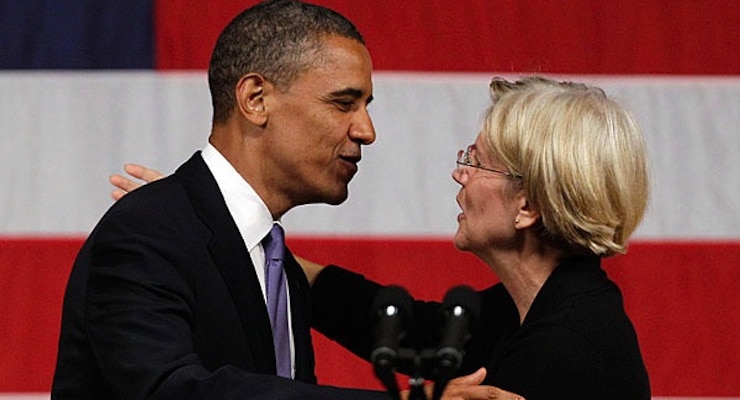

President Barack Obama leans in to kiss Massachusetts senatorial candidate Elizabeth Warren after she introduced Obama before he addresses supporters during a June campaign fundraiser at Symphony Hall in Boston. (Photo: Stephan Savoia/AP)
Since I can’t even keep track of schools of thought on the right (libertarians, traditional conservatives, neocons, reform conservatives, compassionate conservatives, Trump-style populists, etc), I’m not going to pretend to know what’s happening on the left.
But it does appear that something significant – and bad – is happening in the statist community.
Traditionally, folks on the left favored a conventional welfare state, which revolved around two components.
 Means-tested programs for the ostensible purpose of alleviating poverty (e.g.., Medicaid, food stamps, welfare, etc).
Means-tested programs for the ostensible purpose of alleviating poverty (e.g.., Medicaid, food stamps, welfare, etc).- Social-insurance programs for the ostensible purpose of alleviating sickness, unemployment, and aging (e.g., Social Security, Medicare, unemployment insurance, etc).
This agenda was always a bad idea for both macro and micro reasons, and has become a very bad idea because of demographic changes.
But now the left has expanded its goals to policies that are far more radical. Instead of a well-meaning (albeit misguided) desire to protect people from risk, they now want coerced equality.
And this agenda also has two components.
- A guaranteed and universal basic income for everyone.
- Taxes and/or earnings caps to limit the income of the rich.
Taking a closer look at the idea of basic income, there actually is a reasonable argument that the current welfare state is so dysfunctional that it would be better to simply give everyone a check instead.
But as I’ve argued before, this approach would also create an incentive for people to simply live off taxpayers. Especially if the basic income is super-generous, as was proposed (but fortunately rejected by an overwhelming margin) in Switzerland.
I discuss the pros and cons in this interview.
[brid video=”105265″ player=”2077″ title=”Dan Mitchell on the Proposal for Government to Provide a Guaranteed Income”]
By the way, one thing that I don’t mention in the interview is my fear that politicians would create a basic income but then not fully repeal the existing welfare state (very similar to my concern that politicians would like to have a national sales tax or value-added tax without fully eliminating the IRS and all taxes on income).
Now let’s shift to the left’s class-warfare fixation about penalizing those with high incomes.
This isn’t a new phenomenon, of course. We’ve had ideologues such as Bernie Sanders, Thomas Piketty, and Matt Yglesias arguing in recent years for confiscatory tax rates. It appears some modern leftists actually think the economy is a fixed pie and that high incomes for some people necessitate lower incomes for the rest of us.
And because of their fetish for coerced equality, some of them even want to explicitly cap incomes for very valuable people.
The nutcase leader of the U.K. Labour Party, for instance, recently floated that notion. Here are some excerpts from a report in the Guardian.
Jeremy Corbyn has called for a maximum wage for the highest earners… The Labour leader would not give specific figures, but said radical action was needed to address inequality. “I would like there to be some kind of high earnings cap, quite honestly,” he told BBC Radio 4’s Today programme on Tuesday. When asked at what level the cap should be set, he replied: “I can’t put a figure on it… It is getting worse. And corporate taxation is a part of it. If we want to live in a more egalitarian society, and fund our public services, we cannot go on creating worse levels of inequality.” Corbyn, who earns about £138,000 a year, later told Sky News he anticipated any maximum wage would be “somewhat higher than that”. “I think the salaries paid to some footballers are simply ridiculous, some salaries to very high earning top executives are utterly ridiculous. Why would someone need to earn more than £50m a year?”
This is so radical that even other members of the Labour Party have rejected the idea.
Danny Blanchflower, a former member of Corbyn’s economic advisory committee, said he would have advised the Labour leader against the scheme. In a tweet, the former member of the Bank of England’s monetary policy committee said it was a “totally idiotic, unworkable idea”. …Labour MPs expressed reservations… Reynolds also expressed some uncertainty. “I’m not sure that I would support that,” she told BBC News. “I would like to see the detail. I think there are other ways that you can go about tackling income inequality… Instinctively, I don’t think [a cap] probably the best way to go.”
The good news, relatively speaking, is that Crazy Corbyn has been forced to backtrack.
Not because he’s changed his mind, I’m sure, but simply for political reasons. Here’s some of what the U.K.-based Times wrote.
Jeremy Corbyn’s attempt to relaunch his Labour leadership descended into disarray yesterday as he backtracked on a wage cap… The climbdown came after members of the shadow cabinet refused to back the idea of a maximum income while former economic advisers to Mr Corbyn criticised it as absurd.
There don’t seem to be many leftists in the United States who have directly embraced this approach, though it is worth noting that Bill Clinton’s 1993 tax hike included a provision disallowing deductibility for corporate pay over $1 million.
And that policy was justified using the same ideology that politicians should have the right to decide whether some people are paid too much.
In closing, I can’t help but wonder whether my statist friends have thought about the implications of their policies. They want the government to give everyone a guaranteed basic income, yet they want to wipe out high-income taxpayers who finance the lion’s share of redistribution.
I’m sure that work marvelously in the United States. Just like it’s producing great outcomes in place like Greece and Venezuela.






